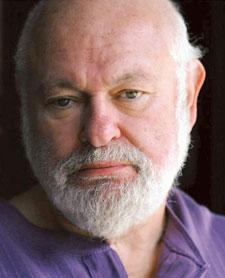Ang Lee definitely has a thing for Americana and the gays. The director of Wedding Banquet and Brokeback Mountain has his latest fare depicting the summer of 1969, which saw Stonewall’s uprising as well as one of the world’s most defining music festivals, Woodstock. He brings all this to the screen via Elliot Tiber’s 2007 memoir Taking Woodstock: A True Story of a Riot, a Concert and a Life.
Tiber is now celebrated as “the man who saved Woodstock.” When festival organizers were ousted from their original venue weeks before the event, Tiber came through with a permit and his neighbour’s huge farm in Bethel, New York. The film follows his behind-the-scenes experiences with an interesting business take on the weekend of free love and harmony.
In a phone interview with Tiber from his place in New York I get the skinny on how the little-memoir-to-big-feature all went down.
Tiber and Lee met when they were both guests on a San Francisco talk show while the director was promoting Lust, Caution. “I feel like I won the lottery,” Tiber says excitedly, noting the film stuck very closely to the book.
“When [Lee] first said he wanted to do the film I said, ‘It’s a condition that before we start is that you don’t change it to just a young man who saved Woodstock,’” says Tiber. “It had to be clear that it’s a gay man. That’s very important to me. And he said, ‘There’s no question. I did Brokeback Mountain.’”
The film focuses on Tiber (played by Demitri Martin) and his parents (Imelda Staunton and Henry Goodman) in the lead-up to Woodstock. The broke family business is suddenly on a goldmine and we see a host of characters descend on their motel the weeks leading up to the concert. But the film is more about young Elliot’s personal journey, his sexual awakening and standing up to his parents.
“That weekend let me feel self-esteem which I didn’t have much of,” recalls Tiber. “I felt fat and ugly, even though I had success as a designer. So I was able to get out and meet people for a change and not have to hide it. It just was freedom.
“It showed the world that a half million people could get together through music and peace and love — a lot of lovemaking. And a lot of gays and lesbians had sex and nobody said anything about it. It’s the first time I ever saw that.”
The film also captures the struggles Elliot and his family faced in a small-town community. One scene shows locals painting anti-Semitic graffiti on their motel.
Tiber’s summation of these people is simple: “They’re rednecks. They shoot Bambi’s mother in the woods. They drink beer. They knew I was a New York decorator — to them that equals faggot — and they painted that on the walls and I had to paint over the walls all the time.”
That weekend though Elliott got some extra help when 100 dykes on bikes came up from New Jersey and offered their security services. “[They] said, ‘We’re volunteering to help you, Elliot. Nobody will mess with us. There’s nobody gonna beat you up.’” Tiber chuckles at the memory. “Nobody messed with those dykes, those wonderful women.”
Tiber is a novelist, playwright, teacher and humorist who has lived and worked in Europe and the US. His memoir gives a full account of his celebrity run-ins (from Janis Joplin to Robert Mapplethorpe) as well as a personal account of his involvement in the Stonewall riots.
“There were only two gay bars in the village,” says Tiber. “The police always harassed us and beat us up outside and took our wallets and stuff like that. I was there that night in June and there were about 50 people in the bar, I guess. The cops came as usual and I said, ‘Let’s put a bar across the door.’ And then someone hollered, ‘Gay power.’ And I said, ‘Huh?!’ We never heard that phrase before.
“I got five other big bears and went out there and overturned the police car and demanded the mayor come. And soon there were a thousand people including Allen Ginsberg out there in front of the bar watching what was going on. They never saw gay people resist anything before.”
The film only mentions Stonewall briefly, focusing more on the music festival. I’m suspicious of the film’s halcyon rendering of early queer culture — with Liev Schrieber (Vilma) as a transsexual in a small town and not a single homophobic remark. But Tiber assures me it’s the Woodstock vibe. “Even the police — they were getting stoned from the fumes of the hash, I guess, because the cops put flowers in their helmets. So the police were with us and protecting us.
“It was all free and loving and no worries about being excluded from the human race and that was the major thing for me there.”
Taking Woodstock is definitely a trip. Split-screen sequences (mirroring the famed 1970 documentary), acid hallucinations and concert promoters on white horses make for a fantastical world. Forty years on the festival is fast becoming mythical.
I ask Tiber if he thinks today’s youth will have a similar experience. “I don’t think the original concept of Woodstock is gonna work again these days. We had a very innocent time as it turns out. I’m hoping they find their own way to make their own Woodstock.”
Taking Woodstock opens Fri, Aug 28 nationwide.


 Why you can trust Xtra
Why you can trust Xtra


